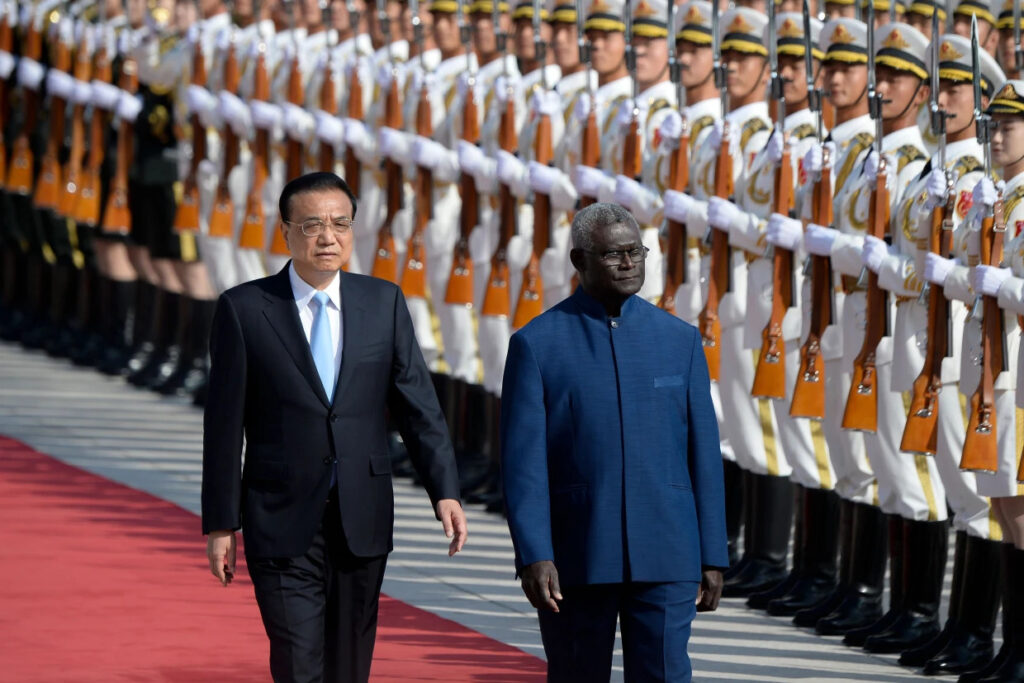War continues to wage in Ukraine, while new concerns to global security appear in the South Pacific. Western leaders were recently alarmed by a proposed Security agreement between the People’s Republic of China and the Solomon Islands. The details had not been disclosed when according to NBC, the U.S. ordered its highest level diplomatic delegation to the Solomon Islands in decades, headed by Kurt Campbell, the top White House official for Asia, and Daniel Kritenbrink, the assistant secretary of state for East Asian and Pacific affairs. They met on Friday, April 22nd, with the Prime Minister of the Solomon Islands, Manasseh Sogavare.
According to NBC, the U.S. delegation intended to warn Sogavare against accepting the deal and offering greater U.S. support. But before the delegation’s arrival, China and the Solomon Islands announced that they had already signed the security agreement. The agreement included giving the PRC the right to send police and armed forces to help maintain social order in the Solomons and allow Chinese warships to make stopovers in the islands. The idea of basing rights has also been brought up in connection to the agreement, but these claims are as of yet unconfirmed.
Foreign policy experts say that this agreement is a game-changer and completely aimed at breaking the U.S. policy of containment toward China in the Indo-Pacific. It also jeopardizes the independence of many South and Central Pacific islands nations and the security of Australia and New Zealand. Military bases on Guadalcanal would only be a mere 1,300 miles from the Australian mainland.
Other Island nations and the Solomon island’s own Parliament have expressed concern over the agreement. The leaders of many Pacific Island nations have expressed that they don’t wish to see their countries once again dragged into a destructive global conflict the way they were during World War II. The President of the Federated States of Micronesia signed an open letter imploring Prime Minister Sogavare to consider the “far-reaching and grave security implications.” The domestic leaders see the move as a way for Sagavare to as a way to delay next year’s election while he re-writes the constitution and forestalls domestic opposition by leaning on Chinese might. Previous attempts at re-writing the constitution had resulted in several days of protests that turned into riots in the capital of Honiara and across the island last year. These protests also leveled accusations of Chinese interference in the government of the Solomons, and Chinses fostered corruption.
Prime Minister Sagavare denied these accusations and promised the U.S delegates when they met on Friday, April 22nd, that China would receive no military base in the Solomons. Instead, the agreement was only to ensure continued Chinese investment by creating a mechanism by which China could protect those investments.
Chinese investment has been increasing the world over with its demands by the PRC for security and military assistance arrangements, allowing China to intervene in the country to protect these investments. Most agreements include major industrial and infrastructure projects, small businesses, and individual citizens. Anything tied to China can prompt a request for Chinese troops and intervention.
China has accused the U.S. of fostering a Cold War mentality, while the U.S. accused China of trying to re-balance the global order in its favor. However, in a press release, China defended the agreement. At the same time, the U.S. announced a commitment to greater engagement in the Indo-Pacific, specifically with the Solomons, where the U.S. will re-open its embassy, which was closed in 1993.
This is just the latest clash between the forces of Democracy and autocracy, each competing to re-shape the post-World War II order in their image.

